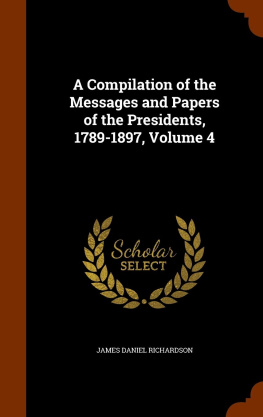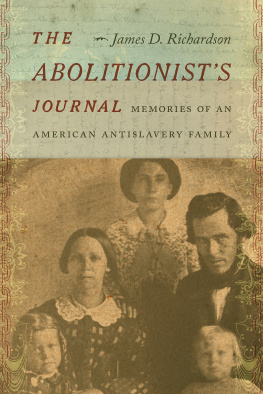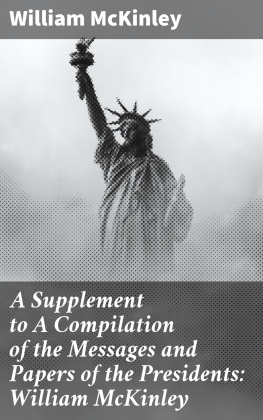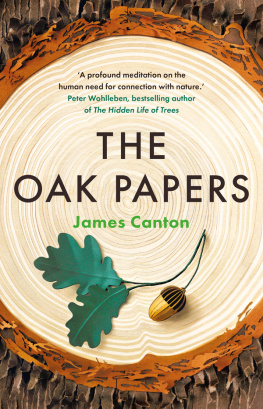Prefatory Note
The Presidential papers during the period from March 4, 1861, to March 4, 1869, are contained in this volume. No other period of American history since the Revolution comprises so many events of surpassing importance. The Administrations of Presidents Lincoln, and Johnson represent two distinct epochs. That of Abraham Lincoln was dedicated to the successful prosecution of the most stupendous war of modern times, while that of Andrew Johnson was dedicated to the reestablishment of peace and the restoration of the Union as it had existed prior to the war. Strange to say, it fell to the lot of the kind-hearted humanitarian, who loved peace and his fellow-man, to wage the bloody conflict of civil war, and the more aggressive, combative character directed the affairs of the Government while the land took upon itself the conditions of peace. Yet who can say that each was not best suited for his particular sphere of action? A greater lover of his kind has not filled the office of President since Thomas Jefferson, and no public servant ever left with the people a gentler memory than Abraham Lincoln. A more self-willed and determined Chief Executive has not held that office since Andrew Jackson, and no public servant ever left with the people a higher character for honesty, integrity, and sincerity of purpose and action than Andrew Johnson. The life of each of these two great men had been a series of obscure but heroic struggles; each had experienced a varied and checkered career; each reached the highest political station of earth. Their official state papers are of supreme interest, and comprise the utterances of President Lincoln while he in four years placed in the field nearly three millions of soldiers; what he said when victories were won or when his armies went down in defeat; what treasures of blood and money it cost to triumph; also, the utterances of President Johnson as he through his eventful term waged the fiercest political battle of our country's history in his efforts, along his own lines, for the restoration of peace and the reunion of the States.
Interesting papers relating to the death and funeral obsequies of President Lincoln have been inserted, as also the more important papers and proceedings connected with the impeachment of President Johnson.
Much time and labor have been expended in the compilation of this volumemore than on any one of the precedingto the end that all papers of importance that could be found should be published; and I feel sure that no other collection of Presidential papers is so thorough and complete.
The perusal of these papers should kindle within the heart of every citizen of the American Republic, whether he fought on the one side or the other in that unparalleled struggle, or whether he has come upon the scene since its closing, a greater love of country, a greater devotion to the cause of true liberty, and an undying resolve that all the blessings of a free government and the fullest liberty of the individual shall be perpetuated.
JAMES D. RICHARDSON.
NOVEMBER 25, 1897.
Abraham Lincoln
ABRAHAM LINCOLN was born in Hardin County, Ky., February 12, 1809. His earliest ancestor in America was Samuel Lincoln, of Norwich, England, who settled in Hingham, Mass., where he died, leaving a son, Mordecai, whose son of the same name removed to Monmouth, N.J., and thence to Berks County, Pa., where he died in 1735. One of his sons, John, removed to Buckingham County, Va., and died there, leaving five sons, one of whom, named Abraham, emigrated to Kentucky about 1780. About 1784 he was killed by Indians, leaving three sons, Mordecai, Josiah, and Thomas, and two daughters. Their mother then located in Washington County, Ky., and there brought up her family. The youngest son, Thomas, learned the trade of a carpenter, and in 1806 married Nancy Hanks, a niece of the man with whom he learned his trade. They had three children, the second being Abraham, the future President of the United States. In 1816 Thomas Lincoln removed to Indiana, and settled on Little Pigeon Creek, not far distant from the Ohio River, where Abraham grew to manhood. He made the best use of his limited opportunities to acquire an education and at the same time prepare himself for business. At the age of 19 years he was intrusted with a cargo of farm products, which he took to New Orleans and sold. In 1830 his father again emigrated, and located in Macon County, Ill. Abraham by this time had attained the unusual stature of 6 feet 4 inches, and was of great muscular strength; joined with his father in building his cabin, clearing the field, and splitting the rails for fencing the farm. It was not long, however, before his father again changed his home, locating this time in Coles County, where he died in 1851 at the age of 73 years. Abraham left his father as soon as his farm was fenced and cleared and hired himself to a man named Denton Offutt, in Sangamon County, whom he assisted to build a flatboat; accompanied him to New Orleans on a trading voyage and returned with him to New Salem, Menard County, where Offutt opened a store for the sale of general merchandise. Mr. Lincoln remained with him for a time, during which he employed his leisure in constant reading and study. Learned the elements of English grammar and made a beginning in the study of surveying and the principles of law. But the next year an Indian war began, and Lincoln volunteered in a company raised in Sangamon County and was immediately elected captain. His company was organized at Richland April 21, 1832; but his service in command of it was brief, for it was mustered out on May 27. Mr. Lincoln immediately reenlisted as a private and served for several weeks, being finally mustered out on June 16, 1832, by Lieutenant Robert Anderson, who afterwards commanded Fort Sumter at the beginning of the civil war. He returned to his home and made a brief but active canvass for the legislature, but was defeated. At this time he thought seriously of learning the blacksmith's trade, but an opportunity was offered him to buy a store, which he did, giving his notes for the purchase money. He was unfortunate in his selection of a partner, and the business soon went to wreck, leaving him burdened with a heavy debt, which he finally paid in full. He then applied himself earnestly to the study of the law. Was appointed postmaster of New Salem in 1833, and filled the office for three years. At the same time was appointed deputy county surveyor. In 1834 was elected to the legislature, and was reelected in 1836, 1838, and 1840, after which he declined further election. In his last two terms he was the candidate of his party for the speakership of the house of representatives. In 1837 removed to Springfield, where he entered into partnership with John T. Stuart and began the practice of the law. November 4, 1842, married Miss Mary Todd, daughter of Robert S. Todd, of Kentucky. In 1846 was elected to Congress over Rev. Peter Cartwright. Served only one term, and was not a candidate for reelection. While a member he advocated the abolition of slavery in the District of Columbia. Was an unsuccessful applicant for Commissioner of the General Land Office under President Taylor; was tendered the office of governor of Oregon Territory, which he declined. Was an able and influential exponent of the principles of the Whig party in Illinois, and did active campaign work. Was voted for by the Whig minority in the State legislature for United States Senator in 1855. As soon as the Republican party was fully organized throughout the country he became its leader in Illinois. In 1858 he was chosen by his party to oppose Stephen A. Douglas for the Senate, and challenged him to a joint debate. The challenge was accepted, and a most exciting debate followed, which attracted national attention. The legislature chosen was favorable to Mr. Douglas, and he was elected. In May, 1860, when the Republican convention met in Chicago, Mr. Lincoln was nominated for the Presidency, on the third ballot, over William H. Seward, who was his principal competitor. Was elected on November 6, receiving 180 electoral votes to 72 for John C. Breckinridge, 39 for John Bell, and 12 for Stephen A. Douglas. Was inaugurated March 4, 1861. On June 8, 1864, was unanimously renominated for the Presidency by the Republican convention at Baltimore, and at the election in November received 212 electoral votes to 21 for General McClellan. Was inaugurated for his second term March 4, 1865. Was shot by an assassin at Ford's Theater, in Washington, April 14, 1865, and died the next day. Was buried at Oak Ridge, near Springfield, Ill.








